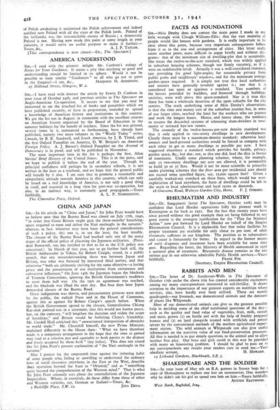CHINA AND JAPAN
Sm,—In his article on " China and Japan," Sir John Pratt would have us believe now that the Burma Road was closed on July 17th, 1940, " in order that Great Britain might gain the three-months' breathing- space required to meet. and defeat the Nazi onslaught in the autumn," whereas, in fact, whatever may have been the general considerations of such a policy, this one is, to say the least, the least tenable. The closure of the Burma Road had marked only one of the many stages of the official policy of placating the Japanese militarists. (Presi- dent Roosevelt, too, has testified to that as far as the U.S. policy was concerned.) In March of that year, not to go further back still, the British Ambassador in Tokyo, Sir Robert Craigie, stated, in a public speech, that any misunderstanding there was between Japan and Britain, was what was fostered by interested third parties, and that otherwise " both are ultimately striving for the same objective—a lasting peace and the preservation of our institutions from extraneous and subversive influences." On June 54th the Japanese began the blockade of Tientsin Concessions, ignoring the British Government's readiness to meet them half way. On the 19th an agreement was reached, and the blockade was lifted the next day. But four days later Japan demanded closure of the Burma Road.
Great indignation was shown, and precautionary protests were made by the public, the radical Press and in the House of Commons, against this as against Sir Robert Craigie's speech before. When the British Government agreed to the closure, Generalissimo Chiang Kai-shek pointed out, in a statement, that this would not hasten peace, but, on the contrary, " will lengthen the duration and widen the scope of hostilities," and Britain would be forfeiting China's friendship. Mr. Cordell Hull criticised this " unwarranted interposition of obstacles to world trade." Mr. Churchill himself, the new Prime Minister, explained differently to the House then: " What we have therefore made is a temporary arrangement in the hope that the time so gained may lead to a solution just and equitable to both parties to the dispute and freely accepted by them both" (my italics). This does not sound like Sir John Pratt's present explanation of " the Nazi onslaught in the autumn."
May I protest for the umpteenth time against the irritating habit of some people who, failing or unwilling to understand the ordinary laws of social dynamics anywhere, in the East or the West, describe their operation beyond the Suez as " Oriental," and as " something quite beyond the comprehension of the Western mind." That is what Sir John Pratt solemnly says about the contradictions of the Japanese Imperialists. Where, in essentials, do these differ from those of other and Western varieties, say, German or Italian?—Yours, &c.






















 Previous page
Previous page